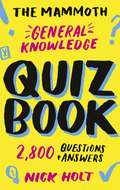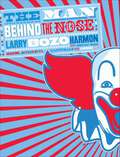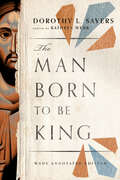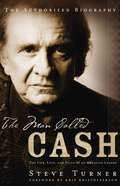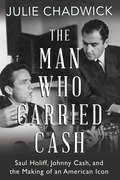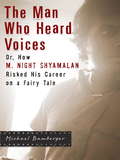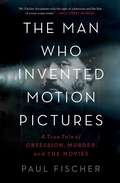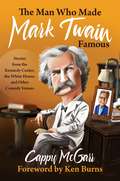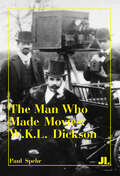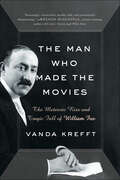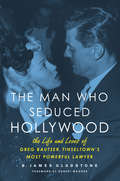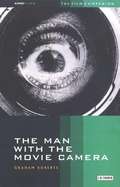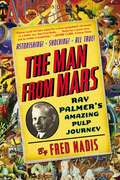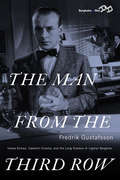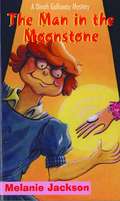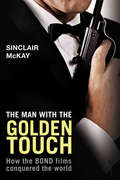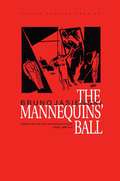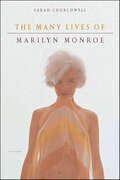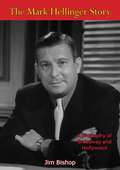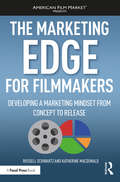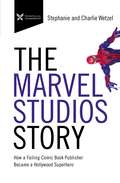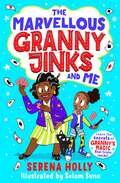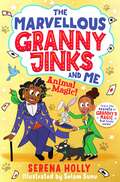- Table View
- List View
The Mammoth General Knowledge Quiz Book: 2,800 Questions and Answers
by Nick HoltA bumper collection of 2,800 questions and answers to test even the most ardent quiz fanatic.
The Man Behind the Nose: Assassins, Astronauts, Cannibals, and Other Stupendous Yarns
by Larry HarmonThe Man Behind the Nose is the autobiography of the man who was Bozo. For 50 years Larry Harmon was the face—and the nose—of Bozo the Clown, the most well-known, beloved clown of them all, the precursor for every successful modern-day harlequin to come, from Ronald McDonald to Krusty. A warm, surprising, and endlessly entertaining life story filled to the brim with “Assassins, Astronauts, Cannibals, and Other Stupendous Tales,” The Man Behind the Nose is a rollicking ride through the world of a true American icon in greasepaint.
The Man Born to Be King: Wade Annotated Edition
by Dorothy L. SayersFrom December 1941 until October 1942, the BBC broadcast a series of radio dramas written by Dorothy L. Sayers.Noted for their use of colloquial English as part of Sayers's effort to bring the Gospels to life in a new way for listeners, the plays were both controversial and incredibly successful, bolstering the morale of the country during the war. They were subsequently published in 1943, and they stand among Sayers's most beloved works to this day.In this new critical and annotated edition, scholar Kathryn Wehr brings fresh insights to the plays, their background, Sayers's creative process, and the ongoing significance of the life of Christ today. Listen again, or for the first time, to the story of the man who was born to be—and still is—king.
The Man Called CASH: The Life, Love and Faith of an American Legend
by Steve TurnerJohnny Cash is one of the most influential figures in music and American popular culture today. While he was an icon to people of all ages during his life, Cash's legacy continues after his death. His remarkable story is captured in this exclusive authorized biography, addressing the whole life of Johnny Cash-not just his unforgettable music but also his relationship with June Carter Cash and his faith in Christ. His authenticity, love for God and family, and unassuming persona are what Steve Turner captures with passion and focus in this inspiring book. Different from other books written about him, The Man Called CASH brings Cash's faith and love for God into the foreground and tells the story of a man redeemed, without watering-down or sugar-coating. Unquestionably one of the biggest book releases of 2004, The Man Called CASH will be a huge success with his millions of fans and will draw in many new fans with this inspiring story of faith and redemption.The audio book, ISBN 084996377X, is narrated by Cash's close friend and musical partner, Kris Kristofferson.
The Man Who Carried Cash: Saul Holiff, Johnny Cash, and the Making of an American Icon
by Julie ChadwickThe unlikely, rocky relationship between an American country superstar and his straightlaced Canadian manager. Before there was Johnny and June, there was Johnny and Saul. The Man Who Carried Cash chronicles a relationship that was both volatile and affectionate between Johnny Cash and his manager, Saul Holiff. From roadside taverns to the roaring crowds at Madison Square Garden, from wrecked cars and jail cells all the way to the White House, the story of Johnny and Saul is a portrait of two men from different worlds who were more alike than either cared to admit. Saul handled the bookings and the no-shows, the divorce and the record deals, drugs, overdoses, and arrests. He was there for the absolute worst of times, but also for the best: Carnegie Hall, Folsom Prison, “A Boy Named Sue,” and Cash’s hit television series. But in 1973, at the zenith of Cash’s career, Saul quit. Until now, no one knew why.
The Man Who Heard Voices
by Michael BambergerNow in paperback, a behind-the-scenes look at the groundbreaking filmmaker M. Night Shyamalan In his relatively young career, M. Night Shyamalan has achieved phenomenal commercial and critical success. His films The Sixth Sense, Unbreakable, Signs, and The Villagehave grossed over $1. 5 billion and reinvented the thriller genre. Because Shyamalan has worked outside of the Hollywood system, however, his filmmaking habits and personality have remained largely unknown. But reporter Michael Bamberger obtained unprecedented access to Shyamalan during the tumultuous production of his film Lady in the Water, and in The Man Who Heard Voicesexposes the struggles and triumphs of this modern-day Hitchcock at work. From revising the screenplay to shooting on location and evaluating the crucial initial test screening, The Man Who Heard Voicestracks all stages in the life of Shyamalan's film. Bamberger delves into Shyamalan's relationship with the actors and the studio (he moved from Disney to Warner Bros. for this film) while also profiling various players on set. The result is a fascinating insider portrait of creative genius-and the real-life story behind a Hollywood thriller.
The Man Who Invented Motion Pictures: A True Tale of Obsession, Murder, and the Movies
by Paul FischerOne of the New York Times Best True Crime of 2022 A &“spellbinding, thriller-like&” (Shelf Awareness) history about the invention of the motion picture and the mysterious, forgotten man behind it—detailing his life, work, disappearance, and legacy.The year is 1888, and Louis Le Prince is finally testing his &“taker&” or &“receiver&” device for his family on the front lawn. The device is meant to capture ten to twelve images per second on film, creating a reproduction of reality that can be replayed as many times as desired. In an otherwise separate and detached world, occurrences from one end of the globe could now be viewable with only a few days delay on the other side of the world. No human experience—from the most mundane to the most momentous—would need to be lost to history. In 1890, Le Prince was granted patents in four countries ahead of other inventors who were rushing to accomplish the same task. But just weeks before unveiling his invention to the world, he mysteriously disappeared and was never seen or heard from again. Three and half years later, Thomas Edison, Le Prince&’s rival, made the device public, claiming to have invented it himself. And the man who had dedicated his life to preserving memories was himself lost to history—until now. The Man Who Invented Motion Pictures pulls back the curtain and presents a &“passionate, detailed defense of Louis Le Prince…unfurled with all the cliffhangers and red herrings of a scripted melodrama&” (The New York Times Book Review). This &“fascinating, informative, skillfully articulated narrative&” (Kirkus Reviews, starred review) presents the never-before-told history of the motion picture and sheds light on the unsolved mystery of Le Prince&’s disappearance.
The Man Who Made Mark Twain Famous: Stories from the Kennedy Center, the White House, and Other Comedy Venues
by Cappy McGarrIn The Man Who Made Mark Twain Famous, Cappy McGarr shares how he became an Emmy-nominated co-creator/executive producer of the Kennedy Center Mark Twain Prize for American Humor, and got involved in national politics—all with charming southern style and a self-deprecating sense of humor.For decades, Cappy McGarr has been in the room where it happens. With The Man Who Made Mark Twain Famous, he&’d like to invite you into that room, complete with his color commentary on the other folks inside. For the first time in print, Cappy reveals how the Mark Twain Prize was conceived, how it changed venues and networks, and even how it almost wasn&’t renewed after a controversial first outing with Richard Pryor. From there, Cappy pulls back the curtain for a behind-the-scenes look at over two decades of the Mark Twain Prize, sharing his take on the Kennedy Center&’s tributes to Pryor, Jonathan Winters, Carl Reiner, Whoopi Goldberg, Bob Newhart, Lily Tomlin, Lorne Michaels, Steve Martin, Neil Simon, Billy Crystal, George Carlin, Bill Cosby, Tina Fey, Will Ferrell, Ellen DeGeneres, Carol Burnett, Jay Leno, Eddie Murphy, Bill Murray, David Letterman, Julia Louis-Dreyfus, and Dave Chappelle. Cappy also gives the inside scoop on several shows he produced from the East Room of the White House, including the Gershwin Prize for Popular Song. Plus, he tells tales from his involvement in national politics—including encounters with the likes of President Lyndon B. Johnson, Senate Majority Leader Tom Daschle, Governor Ann Richards, President George W. Bush, President Barack Obama, and many others. &“Reading Cappy&’s book is not unlike sitting down to dinner with him and listening to the stories he has picked up from decades of rubbing elbows with political leaders and comedians alike. There are historic set pieces. There are laughs and howls and chuckles and chortles.&” —Ken Burns Cappy is donating all of his proceeds from this book to the Kennedy Center Arts Education Programs.
The Man Who Made Movies: W.K.L. Dickson
by Paul SpehrThe story of W.K.L. Dickson—assistant to Edison, inventor, and key figure in early cinematography: “Valuable and comprehensive.” —Communication Booknotes QuarterlyW.K.L. Dickson was Thomas Edison’s assistant in charge of the experimentation that led to the Kinetoscope and Kinetograph—the first commercially successful moving image machines. In 1891–1892, he established what we know today as the 35mm format. Dickson also designed the Black Maria film studio and facilities to develop and print film, and supervised production of more than one hundred films for Edison.After leaving Edison, he became a founding member of the American Mutoscope Company, which later became the American Mutoscope & Biograph, then Biograph. In 1897, he went to England to set up the European branch of the company. Over the course of his career, Dickson made between five hundred and seven hundred films, which are studied today by scholars of the early cinema. This well-illustrated book offers a window onto early film history from the perspective of Dickson’s own oeuvre.
The Man Who Made the Movies: The Meteoric Rise and Tragic Fall of William Fox
by Vanda KrefftThis biography of a forgotten film-industry titan with a still-famous name is both “a great American success story and a shudder-provoking cautionary tale” (The Wall Street Journal).A Huffington Post Best Film Book of the YearA major Hollywood studio still bears William Fox’s name—but the man himself has mostly been forgotten by history, even written off as a failure. This vivid biography, drawing on a decade of original research, corrects the record, explaining why Fox’s legacy is central to the history of Hollywood.Growing up in Lower East Side tenements, the eldest son of impoverished Hungarian immigrants, Fox began selling candy on the street. That entrepreneurial ambition eventually grew one small Brooklyn theater into a $300 million empire of deluxe studios and theaters that rivaled those of Adolph Zukor, Marcus Loew, and the Warner brothers, and launched stars such as Theda Bara. Amid the euphoric roaring twenties, the early movie moguls waged a fierce battle for control of their industry. A fearless risk-taker, Fox won and was hailed as a genius—until a confluence of circumstances, culminating with the 1929 stock market crash, led to his ruin.At the heart of Fox’s life was the myth of the American Dream. His story intertwines the fate of the nineteenth-century immigrants who flooded into New York, the city’s vibrant and ruthless Gilded Age history, and the birth of America’s movie industry amid the dawn of the modern era. “[The author’s] attention to detail makes for gripping storytelling.” —Publishers Weekly“Stunningly researched, lucidly told, and consistently illuminating.” —Brenda Wineapple, award–winning author of The Impeachers“Krefft captures both the culture of the origins of cinema as a business and the many fascinating personalities at play within the narrative. No longer Hollywood’s forgotten pioneer, William Fox now has the history he deserves.” —The Washington Post
The Man Who Seduced Hollywood: The Life and Loves of Greg Bautzer, Tinseltown's Most Powerful Lawyer
by Robert Wagner B. James GladstoneIn Hollywood history, no other lawyer has achieved the movie star-like fame and glamour that Greg Bautzer enjoyed. This revealing biography tells, for the first time, the amazing story of a self-made man who for 50 years used his irresistible charm and prodigious legal talent to dominate the courtrooms, boardrooms, and bedrooms of Hollywood. Columnists of the 1930s through 1950s dubbed him "Hollywood Bachelor Number One," and for good reason. His long-term relationships and momentary conquests were a who's who of leading ladies. Through exclusive interviews with those who knew him best, the book uncovers the inner workings of not only Bautzer the high-powered Hollywood lawyer--whose clients included billionaire Howard Hughes--but Bautzer the man.
The Man With the Movie Camera (KINOfiles Film Companions #2)
by Graham Roberts Roberts GrahamThe "KINO Russian Cinema" series has been expanding to provide students and general readers with readable companion handbooks to important and interesting films of Russian cinema from its beginnings to contemporary times. This volume investigates the production, context and reception of the film "The Man with the Movie Camera" directed by Dziya Ventov, the people who made it, and the film itself, including its place in Russian and World cinema.
The Man from Mars
by Fred NadisThe rollicking true story of the legendary writer and editor who ruled over America's fantasy and supernatural pulp journals in the mid-twentieth century, and shaped today's UFO and sci-fi cultures: Ray Palmer. Meet Ray Palmer. A hustler, a trickster, and a visionary. The hunchbacked Palmer, who stood at just over four feet tall, was nevertheless an indomitable force, the ruler of his own bizarre sector of the universe. Armed with only his typewriter, Palmer changed the world as we know it - jumpstarting the flying saucer craze; frightening hundreds of thousands of Americans with "true" stories of evil denizens of inner earth; and reporting on cover-ups involving extraterrestrials, the paranormal, and secret government agencies. As editor for the ground-breaking sci-fi magazine Amazing Stories and creator of publications such as Other Worlds, Imagination, Fate, Mystic, Search, Flying Saucers, Hidden World, and Space Age, Palmer pushed the limits and broke new ground in science fiction publishing in the 1940s and 1950s--and was reviled for it by purists who called him "the man who killed science fiction." In the first-ever biography devoted to the figure who molded modern geek culture, pulp scholar Fred Nadis paints a vivid portrait of Palmer--a brilliant, charming, and wildly willful iconoclast who helped ignite the UFO craze, convinced Americans of hidden worlds and government cover ups, and championed the occult and paranormal. Palmer overcame serious physical handicaps to become the most significant editor during the "golden age" of pulp magazines; he rebelled in his own inimitable way against the bland suburban vision of the American Dream; he concocted new literary genres; and he molded our current conspiracy culture decades before The X-Files claimed that the truth was out there.
The Man from the Third Row: Hasse Ekman, Swedish Cinema and the Long Shadow of Ingmar Bergman
by Fredrik GustafssonUntil his early retirement at age 50, Hasse Ekman was one of the leading lights of Swedish cinema, an actor, writer, and director of prodigious talents. Yet today his work is virtually unknown outside of Sweden, eclipsed by the filmography of his occasional collaborator (and frequent rival) Ingmar Bergman. This comprehensive introduction—the first ever in English—follows Ekman’s career from his early days as a film journalist, through landmark films such as Girl with Hyacinths (1950), to his retirement amid exhaustion and disillusionment. Combining historical context with insightful analyses of Ekman’s styles and themes, this long overdue study considerably enriches our understanding of Swedish film history.
The Man in the Moonstone (Orca Books)
by Melanie JacksonWhen Dinah gets a part in the musical adaptation of Wilkie Collins' "The Moonstone", she stumbles onto a plot to steal a priceless ring.
The Man with the Golden Touch
by Sinclair MckayWhen Albert R. Broccoli and Harry Saltzman set out to make what they expected to be the first of three or four movies based on the espionage novels of Ian Fleming they can hardly have dreamt that they were founding a business that would still be going strong nearly half a century later. Yet the role of James Bond, which transformed Sean Connery's career in 1962 when Dr No came out, still retained its star-making power in 2006 when Daniel Craig made his Bond debut in Casino Royale. This is the story of how, with the odd misstep along the way, the owners of the Bond franchise, Eon Productions, have contrived to keep James Bond abreast of the zeitgeist and at the top of the charts for 45 years, through 21 films featuring six Bonds, three M's, two Q's and three Moneypennies Thanks to the films, Fleming's original creation has been transformed from a black sheep of the post-war English upper classes into a figure with universal appeal, constantly evolving to keep pace with changing social and political circumstances. Having interviewed people concerned with all aspects of the films, Sinclair Mckay is ideally placed to describe how the Bond 'brand' has been managed over the years as well as to give us the inside stories of the supporting cast of Bond girls, Bond villains, Bond cars and Bond gadgetry. Sinclair Mckay, formerly assistant features editor of the Daily Telegraph, works as a freelance writer and journalist. He is also the author of A Thing of Unspeakable Horror: The History of Hammer Films, which the Guardian called 'A splendid history' and the Independent on Sunday described as 'Brisk, cheerful and enthusiastic'.
The Man with the Golden Touch: How The Bond Films Conquered the World
by Sinclair MckayWhen Albert R. Broccoli and Harry Saltzman set out to make what they expected to be the first of three or four movies based on the espionage novels of Ian Fleming they can hardly have dreamt that they were founding a business that would still be going str Yet the role of James Bond, which transformed Sean Connery’s career in 1962 when Dr No came out, still retained its star-making power in 2006 when Daniel Craig made his Bond debut in Casino Royale. This is the story of how, with the odd misstep along the way, the owners of the Bond franchise, Eon Productions, have contrived to keep James Bond abreast of the zeitgeist and at the top of the charts for 45 years, through 21 films featuring six Bonds, three M’s, two Q’s and three Moneypennies. Thanks to the films, Fleming’s original creation has been transformed from a black sheep of the post-war English upper classes into a figure with universal appeal, constantly evolving to keep pace with changing social and political circumstances. Having interviewed people concerned with all aspects of the films, Sinclair McKay is ideally placed to describe how the Bond ‘brand’ has been managed over the years as well as to give us the inside stories of the supporting cast of Bond girls, Bond villains, Bond cars and Bond gadgetry. Sinclair McKay, formerly assistant features editor of the Daily Telegraph, works as a freelance writer and journalist. He is also the author of A Thing of Unspeakable Horror: The History of Hammer Films, which the Guardian called ‘A splendid history’ and the Independent on Sunday described as ‘Brisk, cheerful and enthusiastic.’
The Man with the Golden Touch: How The Bond Films Conquered the World
by Sinclair MckayWhen Albert R. Broccoli and Harry Saltzman set out to make what they expected to be the first of three or four movies based on the espionage novels of Ian Fleming they can hardly have dreamt that they were founding a business that would still be going str Yet the role of James Bond, which transformed Sean Connery's career in 1962 when Dr No came out, still retained its star-making power in 2006 when Daniel Craig made his Bond debut in Casino Royale. This is the story of how, with the odd misstep along the way, the owners of the Bond franchise, Eon Productions, have contrived to keep James Bond abreast of the zeitgeist and at the top of the charts for 45 years, through 21 films featuring six Bonds, three M's, two Q's and three Moneypennies. Thanks to the films, Fleming's original creation has been transformed from a black sheep of the post-war English upper classes into a figure with universal appeal, constantly evolving to keep pace with changing social and political circumstances. Having interviewed people concerned with all aspects of the films, Sinclair McKay is ideally placed to describe how the Bond 'brand' has been managed over the years as well as to give us the inside stories of the supporting cast of Bond girls, Bond villains, Bond cars and Bond gadgetry. Sinclair McKay, formerly assistant features editor of the Daily Telegraph, works as a freelance writer and journalist. He is also the author of A Thing of Unspeakable Horror: The History of Hammer Films, which the Guardian called 'A splendid history' and the Independent on Sunday described as 'Brisk, cheerful and enthusiastic.'
The Mannequins' Ball
by Daniel Gerould Bruno JaslenskiThis play, by Futurist poet Bruno Jasienski, is an outstanding example of the joining of left-wing politics and avant-garde interest in human mechanization that characterized the experimental theatre of Poland in the inter-war years. Stalinism and the purges cut short Jasienski's career and prevented productions of his play for many years - except for a brilliant constructivist staging in Prague in 1933. The Mannequins' Ball can now take its place along with Capek's R.U.R. as one of the major twentieth-century dramas making use of the themes and techniques of human automata. Reproduced in this volume are the eight woodcuts by Moor which accompanied the original Moscow publication in 1931.
The Many Lives of Marilyn Monroe
by Sarah ChurchwellA brilliant investigation into the debates surrounding Marilyn Monroe's life and the cultural attitudes that her legend revealsThere are many Marilyns: sex goddess and innocent child, crafty manipulator and dumb blonde, liberated woman and tragic loner. Indeed, the writing and rewriting of this endlessly intriguing icon's life has produced more than six hundred books, from the long procession of "authoritative" biographies to the memoirs and plays by ex-husband Arthur Miller and the works by Norman Mailer and Joyce Carol Oates. But even as the books have multiplied, myth, reality, fact, fiction, and gossip have become only more intertwined; there is still no agreement about such fundamental questions as Marilyn's given name, the identity of her father, whether she was molested as a child, and how and why she died.The Many Lives of Marilyn Monroe reviews the unreliable and unverifiable-but highly significant-stories that have framed the greatest Hollywood legend. All the while, cultural critic Sarah Churchwell reveals us to ourselves: our conflicted views on women, our tormented sexual attitudes, our ambivalence about success, our fascination with self-destruction.In incisive and passionate prose, Churchwell uncovers the shame, belittlement, and anxiety that we bring to the story of a woman we supposedly adore. In the process, she rescues a Marilyn Monroe who is far more complicated and credible than the one we think we know.
The Mark Hellinger Story: A Biography of Broadway and Hollywood
by Jim BishopMark Hellinger, beloved newspaperman, whose Broadway column was read daily by 22,000,000 people, and whose years as a Hollywood producer were marked by such outstanding successes as “High Sierra,” “The Killers,” and “Naked City,” died in 1947 in his forty-fifth year. In this book, Jim Bishop, who was his secretary, takes us behind the scenes to live again, the life of a man who “went everywhere, saw everything, and did everything—without exultation or remorse.”Rich with the nostalgic echoes of a note-too-distant past, THE MARK HELLINGER STORY is a magnificent account of a fabulous era—Broadway of the twenties and thirties, from the colossal glamour of the Follies, Vanities, and Scandals to the trenchant wit and lilting tunes of the Little Shows, with the heady smell of printer’s ink and the roar of the night presses; the vast canvas of Hollywood in the silent days, and its sudden rebirth with sound.It is the story, too, of a man who crammed into a lifetime more living than most people will ever know. In the words of Jim Bishop, Hellinger “spent time as though he had stolen it and couldn’t find a fence.”
The Marketing Edge for Filmmakers: Developing A Marketing Mindset From Concept To Release (American Film Market Presents)
by Russell Schwartz Katherine MacDonaldWritten for working and aspiring filmmakers, directors, producers and screenwriters, The Marketing Edge for Filmmakers walks through every stage of the marketing process - from concept to post-production - and illustrates how creative decisions at each stage will impact the marketability of a film. In this book, marketing experts Schwartz and MacDonald welcome you behind the curtain into the inner workings of Marketing department at both the studios and independents. They also track films of different budgets (studio, genre, independent and documentary) through the marketing process, examining how each discipline will approach your film. Featuring interviews with both marketers and filmmakers throughout, an extensive glossary and end-of-chapter exercises, The Marketing Edge for Filmmakers offers a unique introduction to film marketing and a practical guide for understanding the impact of marketing on your film.
The Marvel Studios Story: How a Failing Comic Book Publisher Became a Hollywood Superhero (The Business Storybook Series)
by Charlie Wetzel Stephanie WetzelWhat can you learn from the world&’s most successful companies? Marvel characters have been shaping pop culture for decades and when comic books were no longer keeping the company afloat, Marvel Studios was born.Marvel Studios is the multibillion-dollar home to iconic franchises. They are known for creating brilliant multilayered worlds and storylines that allow their audiences to escape into a fantasy and inspire the creative side of every viewer. But, behind those visionaries is a well-oiled storytelling machine dedicated to getting the Hulk&’s smash fists in the hands of every child and a sea of Spiderman costumes deployed every Halloween.The Marvel Studios Story educates you on how one of the largest creative companies in the planetary universe runs their business and keeps their fans and their parent company, Disney, counting the profits. Through the story of Marvel Studios, you&’ll learn:How to recognize and pursue additional revenue streams.How a company can successfully balance the creative with business to appease investors and fans alike.And how to keep a decades-old superhero franchise new and exciting without losing sight of its roots.The Marvel Studios Story will help you understand and adopt the competitive strategies, workplace culture, and daily business practices that enabled a struggling comic book publisher to parlay the power of myth and storytelling to become one of history&’s most successful movie studios.
The Marvellous Granny Jinks and Me (Granny Jinks #1)
by Serena HollyJoin Jada and Granny Jinks in this charming new series for readers aged 6+! Gorgeously illustrated throughout by Selom Sunu, and brimming with warmth, tricks and magic, this is the perfect read for fans of The Naughtiest Unicorn, Bad Nana and Wigglesbottom Primary! When Jada Jinks finds a box of magic tricks in her granny&’s flat, she uncovers her granny&’s SECRET dream of becoming a magician. Jada soon decides that she&’s going to help Granny Jinks fulfil her dreams, but one thing stands in her way – her dad, Jonny Jinks, who hates magic! Will Jada be able to help Granny Jinks pass the auditions for Dalton Green Magic Society, and will she learn some tricks of her own along the way? Inspired by the true story of Jenny Mayers – the first Black woman to be accepted into the Magic Circle. *Includes how-to magic tricks for you to try at home!* With themes of finding courage, making friends, managing relationships at home, school and in the community, this is a wonderful new series for readers aged 6 and up!
The Marvellous Granny Jinks and Me: Animal Magic! (Granny Jinks #2)
by Serena HollyJoin Jada and Granny Jinks in this charming new series for readers aged 6+! Gorgeously illustrated throughout by Selom Sunu, and brimming with warmth, tricks and magic, this is the perfect read for fans of The Naughtiest Unicorn and Wigglesbottom Primary!Granny Jinks and Jada have officially joined the Dalton Green Magic Society, but the fun has only just started! For their next trick, Granny Jinks and Jada will have to perform magic with the cheekiest assistant of them all – an animal! Will naughty Luna the cat learn her magic trick in time, and will Jada&’s best friend, Matilda, ever find the perfect pet for hers? Inspired by the true story of Jenny Mayers – the first Black woman to be accepted into the Magic Circle.*Includes how-to magic tricks for you to try at home!* With themes of finding courage, making friends, managing relationships at home, school and in the community, this is a wonderful new series for readers aged 6 and up!
